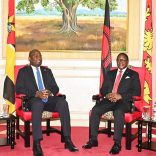President Chapo and King Mswati III strengthen strategic partnership between Mozambique and Eswatini
Mozambique: Government regulates State representation in provinces – AIM report

FILE: Speaking at the end of the weekly meeting of the Council of Ministers (Cabinet), Comoana said there will be, in each province, a Council of Provincial Services, consisting of the Secretary of State, the director of the Secretary of State’s office, and the provincial services of state representation. There will be five such services. [File photo: Miramar]
The Mozambican government on Tuesday approved a set of regulations on how representation of the central State in the provinces will be organised.
According to the Minister of State Administration, Ana Comoana, the regulations seek to put into operation the law passed last year on the representation of the state in the provinces.
Speaking to reporters at the end of the weekly meeting of the Council of Ministers (Cabinet), Comoana said there will be, in each province, a Council of Provincial Services, consisting of the Secretary of State for the province (appointed by President Filipe Nyusi), the director of the Secretary of State’s office, and the provincial services of state representation.
There will be five such services, namely the provincial service of economic activities; of infrastructures; of justice; of the environment; and of social matters. Comoana said the Secretary of State will manage all five provincial services.
“Each of these services naturally covers several fields”, said the minister. She added that in setting them up, the principle of integration prevailed, so that the structure would be “rational, flexible, effective, efficient but also a structure that avoids any situation of overlapping tasks”.
Maputo city is somewhat different from the rest of the country, in that it will only have three services run by the Secretary of State – the services of economic activities, of justice, and of social affairs. Everything else will be dealt with by the Mayor of Maputo and the Municipal Council.
Comoana added that the Secretary of State has powers to supervise and to operate in any areas that have not been decentralised to the provincial governor or the municipal council.
She gave no details of the powers that will be left in the hands of the provincial governors: but essentially, they will be everything not covered by the five services.
Prior to this dispatch, it was widely believed that the Secretaries of State would be limited to representing in the province the President of the Republic and the central government, and carrying out the functions of sovereignty (such as defence and security, and public order).
But the document unveiled by Comoana makes it clear that the powers of the Secretary of State are much wider.












Leave a Reply
Be the First to Comment!
You must be logged in to post a comment.
You must be logged in to post a comment.